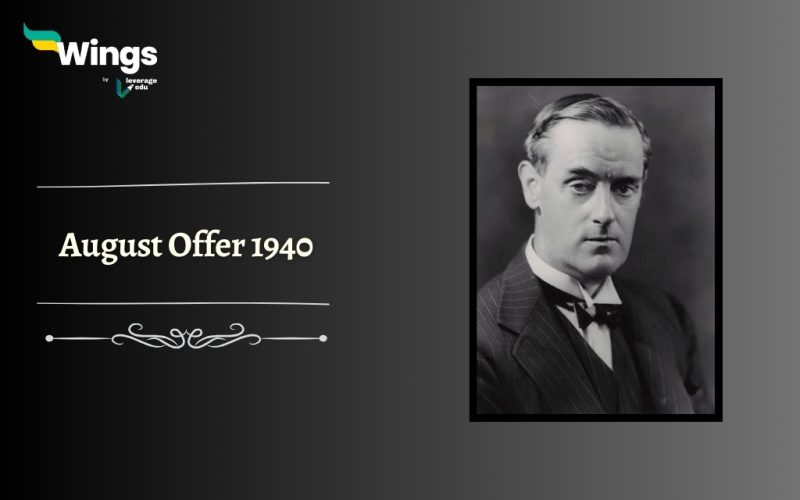The August Offer 1940 refers to a popular statement published on 8th August 1940 by Lord Linlithgow, the then Viceroy of India. In simple words, the proposal was actually a response to the demands of the Indian National Congress that were made in return for helping the British government launch a fully-fledged war due to the fall and seizure of France by forces in the opposition. In this blog, we will explore the background of the August Offer 1940, its key recommendations, its response to the proposal, and other fascinating details.
Table of Contents [show]
Historical Background
Before moving on, let us first discuss the background of the August Offer 1940.
- During the Second World War, leaders of the Indian National Congress were upset over the fact that the British government dragged India into a war. This included the declaration made by Lord Linlithgow to engage India in a war with Germany.
- Leaders of the INC were displeased over the unilateral decision of the government to engage in the war.
- France was also occupied by the Axis Powers and was suffering huge losses.
- There was also an unanticipated change in the government of Britain that included Winston Churchill becoming the British Prime Minister in 1940.

- Since Britain itself was prone to being occupied by Nazis, the INC became less rigid with its stand. It agreed to support the cause of the war only if the British government agreed to transfer the power to an interim government of India.
- In light of these events, the then Viceroy Linlithgow proposed the August Offer 1940.
Also Read: Charter Act of 1853
Key Recommendations of the August Offer 1940
It put forward numerous recommendations such as:
- A representative Indian body will be established after the war. It will be empowered to frame the constitution of India and implement the Dominion status in India.
- It will also establish an Executive Council of the Viceroys and aim to increase the number of Indians in it.
- Additionally, the August Offer also aimed to establish a war council.
- It also assured the minority community of India that no transfer of power would take place.
- Moreover, the Viceroy also mentioned that no changes will be made in the Government of India Act.
Also Read: The Government of India Act 1919
What was the Response of Indian Leaders?
- The August Offer was ultimately rejected by the Indian National Congress during the meeting held at Wardha in August 1940.
- Instead, the INC put forward its demand for complete freedom from colonial rule and the sovereignty of the nation.
- Pandit Jawaharlal Nehru, the first Prime Minister of India, considered the “Dominion status concept is dead as a doornail” while rejecting the proposal.
- Apart from this, the INC also stated that the reason for rejection is that nothing short of partitioning would be accepted as a remedial solution.
- Post this meeting, Mahatma Gandhi initiated the Satyagraha movement and avoided mass involvement to prevent violence.

- Nonetheless, people started joining the movement and the first three satyagrahis were Vinoba Bhave, Nehru, and Brahma Datt. Later on, all three were eventually jailed.
- On the other hand, the Satyagrahis also initiated the Delhi Chalo Movement which failed to gather support and was eventually aborted in December 1940.
- It was only after the failure of the August Offer that the British government sent the Cripps Mission to India.
Also Read: The Charter Act of 1833: Provisions, Features
What is the Significance of the August Offer?
Although ultimately rejected by the Indian National Congress and the All India Muslim League, the August Offer 1940 holds grave significance.
- It was for the first time in the history of India that the British government realized the right of the Indian citizens to frame their own constitution.
- By increasing the number of Indians in the Viceroy’s Executive Council, the Offer also paved the way for increased Indian representation in the government.
- It also allowed the leaders of India to open doors for further negotiations with the government.
Related Blogs
FAQ
The August Offer of 1940 was made by Viceroy Linlithgow. It included expanding the Executive Council of the Viceroy of India to include more Indian citizens. Moreover, it also aimed to establish an advisory war council, giving more weightage to the minority section, and finally recognizing the rights of Indian citizens to frame their own constitution.
The popular August Offer of 1940 was rejected by the Congress Working Committee during its meeting at Wardha on 21 August 1940. Instead, it demanded complete freedom and sovereignty from the colonial power.
The August Offer was dismissed by the Congress Government on 21 August 1940 in a meeting at Wardha. It was rejected on the fact that the Britishers were not guaranteeing their complete sovereignty and just the Dominion Status for the country.
That’s all about August Offer 1940! If you want to know more about topics like this, then visit our general knowledge page! Alternatively, you can also read our blog on general knowledge for competitive exams!
 One app for all your study abroad needs
One app for all your study abroad needs















 45,000+ students trusted us with their dreams. Take the first step today!
45,000+ students trusted us with their dreams. Take the first step today!
